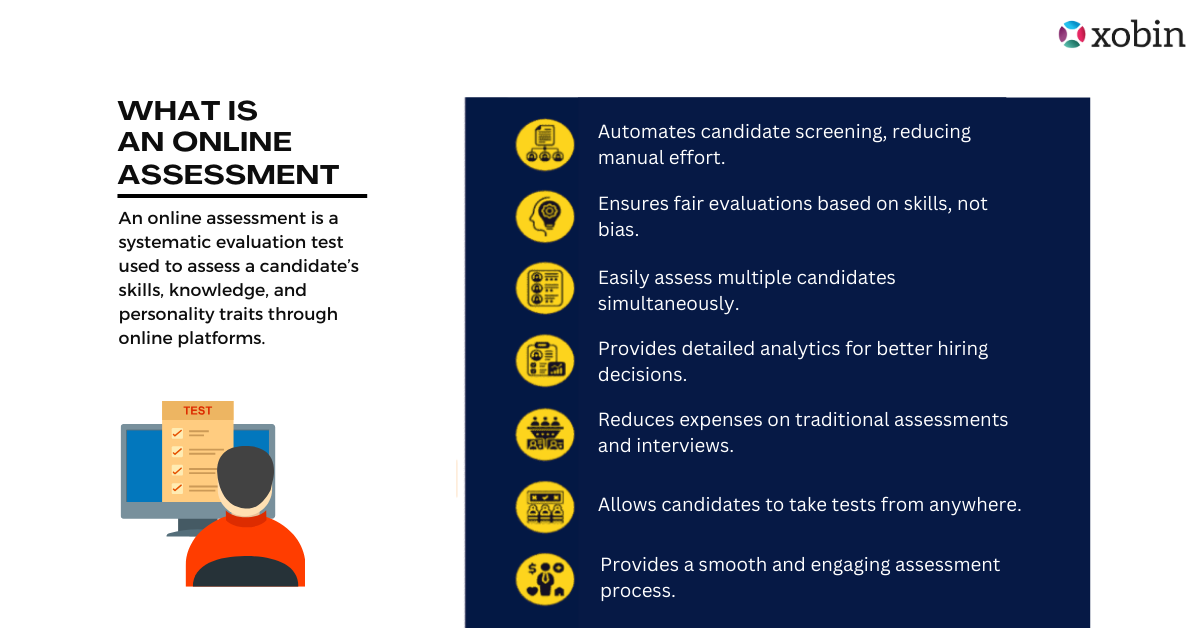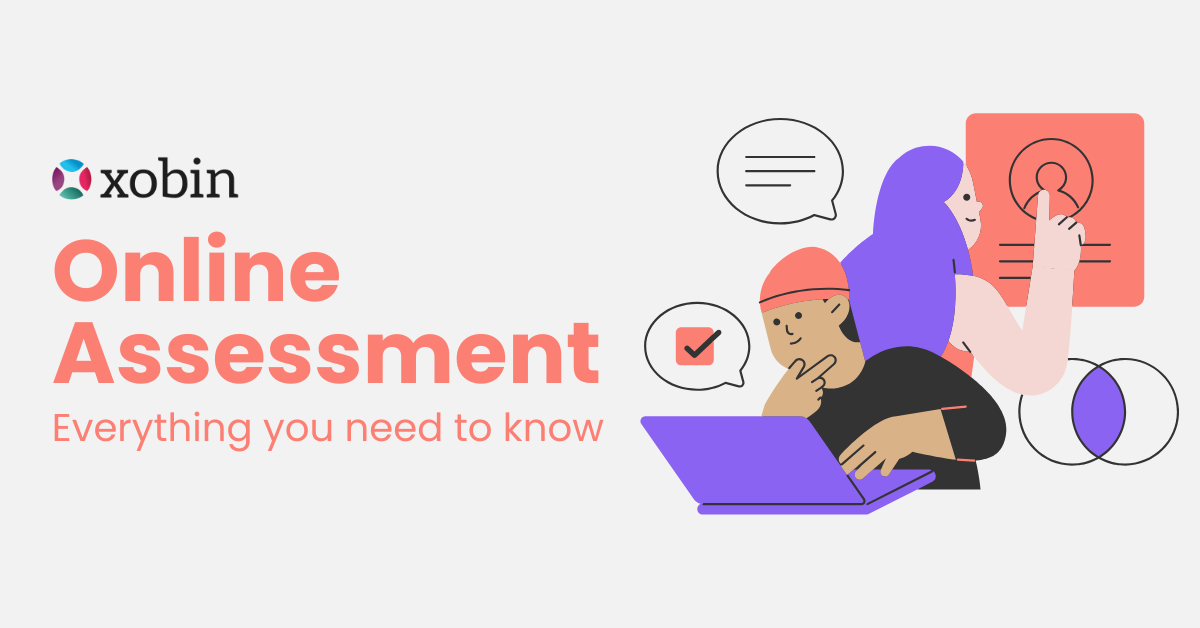Traditional recruitment techniques are no longer sufficient to effectively identify top talent due to the changing nature of the hiring landscape. Online skills-based assessments have become a game-changer for recruiters, helping them make data-driven hiring decisions while saving time and effort. However, what is an online assessment and why is it useful? We’ll go over all you need to know about it in this blog. You’ll learn about their types and benefits to how they work, which will help you make your hiring process more efficient. This guide is for you if you want to use online tests effectively!
Table of Contents
What is an Online Assessment?
An online assessment is a systematic evaluation test used to assess a candidate’s skills, knowledge, and personality traits through online platforms. It replaces traditional pen-and-paper tests with a seamless, automated system, allowing participants to complete evaluations remotely at their convenience. These assessments can range from technical skill tests, cognitive ability evaluations, and personality assessments to behavioral and job-specific competency tests. Moreover, online assessments offer greater flexibility, scalability, and efficiency, making them ideal for hiring, training, and academic evaluations.

Companies and educational institutions rely on online assessments to conduct impartial and fair evaluations, monitor progress, and streamline the candidate screening process. With features such as real-time analytics, automated scoring, remote proctoring, and customizable test formats, these assessments offer significant advantages. They enhance decision-making, reduce administrative burdens, and improve accuracy, making them an invaluable tool for modern organizations.
Types of Online Assessment Tests

Online assessments come in various formats depending on what recruiters need to evaluate. Here are the most commonly used types:
1. Skill-Based Assessments
A skill-based online assessment evaluates a candidate’s proficiency in job-related skills. These tests measure technical, analytical, and soft skills, ensuring that applicants have the expertise required for a role. Recruiters use skill-based assessments to validate claims made in resumes, making hiring decisions more data-driven and objective. Some common examples include:
2. Cognitive Ability Tests
Cognitive Ability Tests help evaluate problem-solving, logical reasoning, numerical skills, and critical thinking. These tests are especially useful for roles that demand quick decision-making and strong analytical skills. Recruiters can use online cognitive ability assessments to find candidates with high intellectual potential and adaptability. Some common examples of cognitive ability assessments include:
3. Technical & IT Assessments
Online technical assessments cover more than just coding. They assess a candidate’s knowledge in areas like networking, cybersecurity, database management, cloud computing, and DevOps. By using these tests, recruiters can identify specialists capable of managing complex IT projects and handling infrastructure tasks effectively.
4. Online Personality Assessments
An online personality assessment evaluates behavioral traits, communication style, and emotional intelligence. It helps recruiters determine a candidate’s work ethic, leadership potential, and cultural fit. These assessments are widely used to ensure team compatibility and long-term employee satisfaction. Some popular personality assessments include:
- The Big Five Personality Test
- DISC Personality Test
- 16 Personality Type Test
- Culture Add Online Test
5. Online Coding Assessments
Coding skills online assessments evaluate a candidate’s ability to write, optimize, and debug code. These assessments offer real-time coding environments where candidates solve problems in languages like Python, Java, C++, and JavaScript. AI-powered evaluation provides instant feedback, ensuring a fair and unbiased selection process.
6. Online Psychometric Assessments
Psychometric assessments analyze a candidate’s cognitive abilities, personality, and behavioral tendencies. They combine multiple test formats, including aptitude, situational judgment and emotional intelligence assessments. These tests help recruiters predict job performance, leadership potential, and interpersonal skills. Examples of psychometric assessments includes:
- Situational Judgment Test (SJT)
- Emotional Intelligence Test
- Leadership Psychometric Test
- Aptitude Online Test
7. Language Proficiency Tests
For global and customer-facing roles, a communication checker tool is best to use. It assesses language proficiency of a candidate’s speaking, writing, reading, and comprehension skills. The tool ensures that applicants have the necessary fluency and grammar accuracy to communicate effectively in the workplace. Examples of Language Proficiency Tests:
- English Proficiency Test
- Online communication Assessment Test
- French/Spanish/German Proficiency Test
- IELTS (International English Language Testing System)
8. Video-Based Online Assessment
A video-based online assessment allows candidates to respond to pre-recorded questions using video submissions. AI-powered facial analysis and speech recognition evaluate confidence, clarity, and communication skills. Recruiters can assess soft skills, personality traits, and cultural fit in a time-efficient manner. Examples of Video-Based Assessments:
- Pre-recorded Video Interview
- Facial Expression & Confidence Evaluation
- Speech Clarity & Pronunciation Test
- Cultural Fit & Team Compatibility Test
9. Game-Based Online Assessment
A game-based online assessment uses gamification techniques to evaluate a candidate’s cognitive abilities, problem-solving skills, and decision-making capabilities. These assessments make the hiring process engaging while providing valuable behavioral insights. They are particularly effective in assessing creative thinking and adaptability in candidates. Examples of Game-Based Assessments:
- Cognitive Ability Game
- Problem-Solving Challenge
- Strategy & Critical Thinking Games
- Decision-Making Simulation
How Does Online Assessment Work?

Step 1: Define Job Requirements and Select the Right Test
The first step in any online assessment process is identifying the skills, competencies, and personality traits required for the job role. Recruiters work with hiring managers to outline key job responsibilities and determine:
- Technical skills required (e.g., coding, IT knowledge, data analysis)
- Soft skills (e.g., communication, teamwork, problem-solving)
- Cognitive abilities (e.g., logical reasoning, numerical aptitude)
- Behavioral and personality traits (e.g., leadership, adaptability)
Once the requirements are clear, recruiters select the most relevant online assessment test. Custom tests can also be created to match the organization’s hiring needs.
Step 2: Test Configuration and Customization
Recruiters can also brand the assessment platform with their company logo and colors to maintain a professional image. Modern online assessment software allow recruiters to customize tests based on:
- Test duration: Set a time limit for each section.
- Question type: Choose from multiple-choice, coding challenges, case studies, video responses, or gamified assessments.
- Difficulty level: Adjust complexity based on experience level (entry-level, mid-level, senior).
- AI-based proctoring: Enable advanced proctoring features like webcam monitoring, screen tracking, and plagiarism detection to prevent cheating.
Step 3: Inviting Candidates to Take the Assessment
After configuring the test, recruiters share the assessment link with candidates via email, Applicant Tracking System ATS, or career portals. Candidates can access the test from anywhere, anytime, using a laptop or mobile device.
To ensure transparency, candidates are provided with:
- Clear instructions on how to complete the test
- Details on time limits and test structure
- Guidelines on proctoring and anti-cheating measures
Step 4: Real-Time Test Execution and AI-Proctoring
Once candidates start the assessment, the system automatically records and monitors their activity. AI-powered proctoring ensures fairness by detecting:
- Eye movement tracking to prevent looking away from the screen
- Facial recognition to verify candidate identity
- Screen monitoring to prevent tab-switching or searching for answers
- Audio detection to flag external voices or suspicious sounds
This level of monitoring eliminates cheating, ensuring that only the best candidates qualify for the next hiring stage.
Step 5: Automated Evaluation and Scoring
One of the biggest advantages of online assessments is instant and unbiased scoring. For recruiters, this means no manual grading, no bias, and faster hiring decisions. The AI-driven answer evaluation system automatically evaluates:
- Multiple-choice answers based on correctness
- Coding tests based on accuracy, efficiency, and execution time
- Cognitive ability tests based on problem-solving speed and correctness
- Video-based assessments using AI for speech clarity, confidence, and sentiment analysis
Step 6: Generating Detailed Reports and Insights
Once candidates complete the test, the online assessment platform provides the advanced actionable reports, showing:
- Overall performance scores
- Strengths and weaknesses analysis
- Time taken per question
- Comparative ranking with other candidates
Step 7: Moving the Best Candidates to the Next Stage
Based on the assessment results, recruiters can:
- Automatically filter top candidates for interviews
- Send rejection emails to those who don’t meet the criteria
- Invite shortlisted candidates for further screening rounds
Benefits of Using Online Assessment
1. Saves Time and Speeds Up Hiring
Recruiters often spend weeks screening resumes and conducting interviews. Online assessments automate the initial screening process, significantly reducing hiring time. With instant evaluation and AI-powered reports, recruiters can shortlist top candidates within hours instead of days.
- Reduce screening time by up to 80%
- Automate resume filtering with AI-driven skills testing
- Focus on interviewing only the most qualified candidates
2. Ensures Unbiased Hiring
Recruiters often encounter unconscious bias, which can result in poor hiring decisions. To address this challenge, employers leverage advanced online assessment tools that use AI-driven algorithms to evaluate candidates based solely on merit. Consequently, these tools eliminate biases related to gender, ethnicity, and background, ensuring a fairer recruitment process.
- Fair evaluation for all candidates
- Data-driven scoring ensures impartiality
- Better workplace diversity and inclusion
3. Improves Hiring Accuracy
Resumes frequently leave out important details. Online assessments ensure that applicants possess the real-world experience required for the position. Before employing a candidate, recruiters can gain a good idea of their skill set by evaluating them in real-world situations.
- Hire based on real skills, not just resumes
- Predict job performance more accurately
- Reduce the chances of mis-hiring
4. Enhances Candidate Experience
A slow and outdated hiring process frustrates candidates and increases dropout rates. Online assessments streamline the experience by making it smooth, engaging, and transparent. Candidates can conveniently showcase their skills remotely, improving overall satisfaction.
- User-friendly platform with an intuitive interface
- Remote assessments eliminate location barriers
- Flexible scheduling improves engagement
5. Reduces Cost-Per-Hire
Recruitment expenses, including manual resume screening, in-person interviews, and administrative work, can be costly. Online evaluation tools help companies save money by automating candidate evaluation, minimizing human effort, and reducing the number of unqualified interviews.
- Cut hiring costs by up to 60%
- Reduce HR workload with automated assessments
- Lower employee turnover by hiring the right talent
6. Enables Remote Hiring
As remote work continues to grow, online assessments play a crucial role in global hiring. They enable companies to evaluate candidates from anywhere, ensuring access to the best talent worldwide without geographical constraints.
- Hire talent globally without additional costs
- Assess candidates remotely with AI-powered proctoring
- Standardized evaluations ensure consistency
7. Provides Data-Driven Insights for Better Decision Making
Recruiters no longer have to rely on gut feelings when making hiring decisions. Online assessment platforms generate detailed reports, skill scores, and analytics, allowing HR teams to make well-informed hiring choices.
- Real-time performance reports for data-backed decisions
- Compare candidates objectively using AI-driven insights
- Predict employee success based on assessment scores
Uses of Online Assessments
Online assessments are transforming the way organizations hire, train, and evaluate talent. These assessments are not just for recruitment but also play a crucial role in employee development and workforce upskilling. Below are some key use cases of online assessments that help businesses streamline their talent strategies.
1. Pre-Employment Testing for Hiring the Right Talent
Recruiters use online assessments for recruitment to filter and shortlist top candidates before the interview stage. For example, a software company can use coding assessments to test coding skills, while a marketing firm may assess analytical reasoning and content creation abilities. These assessments help in:
- Evaluating job-specific skills (e.g., coding, sales, finance)
- Measuring cognitive abilities like problem-solving and critical thinking
- Assessing cultural fit through personality and behavioral tests
- Reducing hiring time by automating the screening process
2. Campus Recruitment
Many organizations hire fresh graduates from universities and colleges. Online assessments help recruiters:
- Screen a large pool of candidates efficiently
- Identify students with the best potential
- Ensure fair and unbiased hiring decisions
3. Internal Employee Training & Development
Companies use online assessments to:
- Identify skill gaps in existing employees
- Personalize training programs based on assessment results
- Ensure continuous learning and professional development
For example, a bank can test its employees on risk management and compliance, while a customer service team may take assessments on problem-solving and communication skills.
4. Workforce Upskilling & Reskilling
As industries evolve, employees must learn new skills to stay competitive. Tech companies, for example, use coding assessments to evaluate software developers on new programming languages like Python or React.js. Online assessments help companies determine:
- Who needs upskilling in emerging technologies?
- Which employees can transition into new roles?
- What training programs will be most effective?
5. Remote Hiring & Global Talent Acquisition
With remote work on the rise, online assessments allow companies to:
- Hire talent from different locations without physical interviews
- Evaluate candidates through AI-proctored online tests
- Save time and resources in the hiring process
6. Promotions & Leadership Assessments
Companies use online assessments to determine which employees are ready for higher roles. For example, a company can assess problem-solving and team management skills before promoting someone to a managerial role. These assessments help:
- Identify leadership potential
- Evaluate decision-making and strategic thinking
- Ensure promotions are based on merit, not bias
Conduct Online Assessment with Xobin!
Finding the right talent and ensuring employees stay up-to-date with essential skills is crucial for business success. Xobin’s Online Assessment Platform is designed to help hiring teams conduct pre-employment skills tests efficiently while enabling learning and development teams to identify skill issues and create tailored training programs.
With a 3400+ skill assessment test and 2500+ job role based tests, Xobin ensures a seamless assessment experience. Whether you’re hiring top talent or upskilling your workforce, Xobin provides the tools to make data-driven decisions with confidence. Ready to streamline hiring and employee development? Book a personalized demo today!






